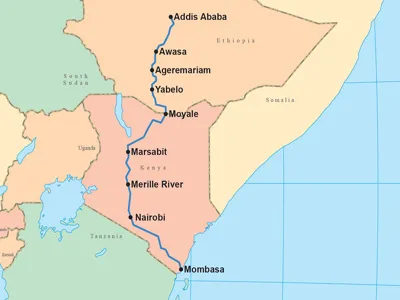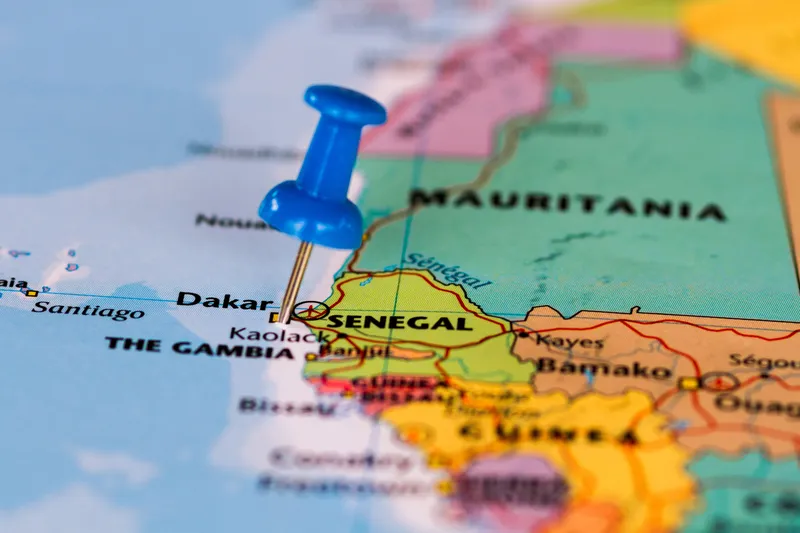Ethiopia is pursuing a 10-year $2.4 billion development plan, part of which are ambitious road developments. Shem Oirere reports Ethiopia is hastening its pace towards accessing a share of the East Africa commodity market and opening itself up for foreign investment through the implementation of an ambitious road development strategy, the Road Sector Development Programme (RSDP). The landlocked nation has convinced a number of international lenders of the viability of RSDP, with some of them now loosening
June 13, 2012
Read time: 8 mins

Ethiopia is pursuing a 10-year $2.4 billion development plan, part of which are ambitious road developments. Shem Oirere reports
Ethiopia is hastening its pace towards accessing a share of the East Africa commodity market and opening itself up for foreign investment through the implementation of an ambitious road development strategy, the Road Sector Development Programme (RSDP).The landlocked nation has convinced a number of international lenders of the viability of RSDP, with some of them now loosening their purses to ensure the success of the plan, which will improve the country's main road network and extend its regional network to ensure its 6%-plus annual economic growth rate is sustained or improved on.
“The government has focused on network expansion, particularly the upgrading and construction of link roads to specifically address the deficiencies in access to potentially rich agricultural areas and mobility in rural areas as part of a broad-based rural development strategy,” said a report by the Ethiopia Roads Authority (ERA), a state agency for the development and maintenance of the country's roads.
Support for Ethiopia's road development strategy has come from a number of financiers with the
The financiers seem to have given priority to road projects that will link the country to the East Africa road network, enabling the landlocked nation of 84 million people access key outlets to international markets as easing its movement of goods and services.
The AfDB bank has recently announced a US$234.5 million loan for Ethiopia's road development programme specifically for two roads (the 112km Bedele-Metu highway and the 197km Hawassa-Ageremariam, that will see the country access ports in neighbouring Sudan and Kenya.
“The road corridor will serve as a lifeline to a broad range of economic development activities within the corridor which borders other countries in the region,” said a statement by the AfDB.
The largest share of the AfDB funding, $168 million, will go towards the Hawassa-Ageremariam road, part of a larger road that links Ethiopia to East Africa's largest sea port of Mombasa in neighbouring Kenya.
“The Hawassa-Ageremariam road upgrading, which is the third phase of the Mombasa-Nairobi-Addis Ababa corridor project, and part of the Trans-African Highway network is expected to promote trade, regional integration and alleviate poverty through highway infrastructure development and the management of road-based trade corridors,” said Ato Ahmed Shide, Minister of Finance and Economic Development.
The road project involves the construction to bitumen standard of 198km.
The other segment of the regional road corridor project is the 122km Turbi-Moyale road section in Kenya.
“Regional beneficiaries are producers, manufacturers and traders who have a trade corridor to move inputs, final products and imports at reduced time and cost,” says AfDB.
The Awasa-Ageremariam road contract has been divided into three sections by the ERA for Awasa–Chuko (66km), Chuko–Yirgachefe (60km) and Yirgachefe–Ageremariam (72km). The three road sections will see the rehabilitation of the existing bituminous road with AfDB providing 93.1% and Ethiopia contributing 3.5% of the total project costs.
The overall project implementation time is from 2012 to 2017.
The contractor will, in addition to the main road works, construct bridges, drainage structures and roadside amenities in conformity with Environmental Impact Assessment (EIA) submitted to AfDB.
Prior to the signing of the funding by Minister Shide for Ethiopia and Lamin Barrow for AfDB, the ERA had sought the bank’s help in building its own capacity not only to supervise the project but also to ensure that the post-project management capacity of the authority is adequate.
Since the road is a regional link, Ethiopian authorities also received support from the bank for capacity enhancement on trade and transport facilitation. This is necessary in view of the planned Road Transit Services Agreement between Ethiopia and Kenya which will be operationalised by 2017.
Engineering design indicates that the road will be a 7m wide asphalt paved carriageway with 2m sealed shoulders.
“The section is currently paved hence the design recommends recycling of the existing pavement structure and takes into account the residual bearing capacity of the existing pavement,” says a project brief by AfDB.
The Awasa-Ageremariam road will pass through eight administrative regions on its way to link to the Kenyan section of the corridor.
ERA has awarded the construction contract to Egypt’s Arab Contractors Company (AC), whose manager Ahmed Moustafa said that this was the first time in many years that an Egyptian construction company had won a contract in Ethiopia.
“Besides, it will strengthen the Egyptian–Ethiopian relationship and support the relations among the River Nile basin countries especially concerning the potable water case,” he said.
Both Kenya and Ethiopia anticipate the value of trade between them to grow from an estimated $35 million to over $175 million once the road, and other planned transport linkages between the two countries, are completed.
The
“The project is expected to further enhance the regional trade between Kenya and Ethiopia, providing greater security and conflict resolution in the area,” said a feasibility study report for the road.
The Bedele-Metu highway on the other hand, covers a large part of Oromia National Regional State and will cost $64 million with AfDB saying that it forms part of a larger network designed to join the capital Addis Ababa to South Sudan’s capital, Juba.
Engineering designs show that the road starts from Bedele town at the junction with Nekemte-Bedele road and ends at Metu town at the Sor River crossing.
Project works for this highway include the widening of the existing road to 10m with 1.5m sealed shoulders on each side from the current 6m with no shoulders.
“The project will follow existing alignment with minor realignment at some locations mainly to improve geometry and for safety considerations,” says the road’s engineering design report.
The winner of the tender for the road, currently at the bidding stage, will also construct a pavement with asphalt concrete surface in addition to improving drainage facilities along the highway.
Sections of the highway that pass through towns will be widened to 14m to facilitate vehicle parking while there will be 2.5m wide pathways.
“The existing road was originally paved about 20 years ago but its entire length has now deteriorated considerably,” a brief by the ERA says.
Ethiopia considers the Bedele-Metu vital in its strategy to modernise transport to support its growing economy and also open its markets to regional goods as it too seeks to access the regional markets.
Completion of construction works in four years will improve the ferrying of Ethiopia’s coffee and cereals, the major crops in the region covered by the road, to local and regional markets. The link will also reduce the distance by 30km between Addis Ababa to Gambela city through Nekemte as compared to the longer Addis-Ababa-Nekemte-Gimbi-Gambela road.
The improved road will also enable the efficient movement of goods and people.
The government of Prime Minister Meles Zenawi has built into the project a strategy to increase access to social services, including health and education, especially in rural regions.
Growth of small and medium agro-based enterprises is anticipated in addition to increased export volumes, especially of coffee, because of the convenient transport infrastructure.
“The project’s immediate beneficiaries include smallholder farmers, coffee producers, traders, agro-based industries including a beer brewery and a sugar factory,” says ERA in a previous briefing.
“Transporters will also benefit from reduced travel time, increased speed and reduced vehicle operating costs while the general public in the sub-region as a whole will have improved access to social amenities.”
However, the contractor will face a serious challenge in negotiating around the five rivers and several streams, marshes and wetlands.
But more challenging in the course of construction is the provision of alternative tracks parallel to the road, AfDB says, or the widening of the carriageway further to allow for a cattle lane for livestock.
For the long-term, Ethiopia is pursuing a 10-year $2.4 billion Plan for Accelerated and Sustained Development to End Poverty (PASDEP) road programme, which forms the basis for the implementation of the RSDP.
The financiers targeted to back the planinclude International Development Assistance (IDA); the European Union (EU); the African Development Bank (AfDB); the Nordic Development Fund (NDF); the Arab Bank for Economic Development in Africa (BADEA); the OPEC Fund; the Saudi Development Fund; the UK; Ireland; Japan; Germany; Sweden; the Road Fund; and the Government of Ethiopia.
“With the recent increase in oil prices, which in turn affect bitumen and asphalt prices, the costs and scale of the programme will have to be reappraised through the annual budget process as we go along in the course of implementing PASDEP,” says a release by the Ministry of Finance and Economic Development.






